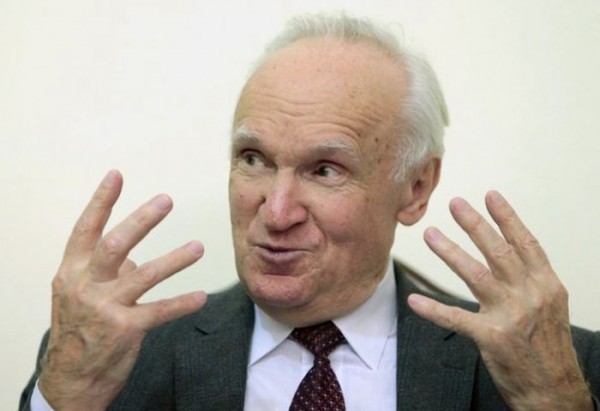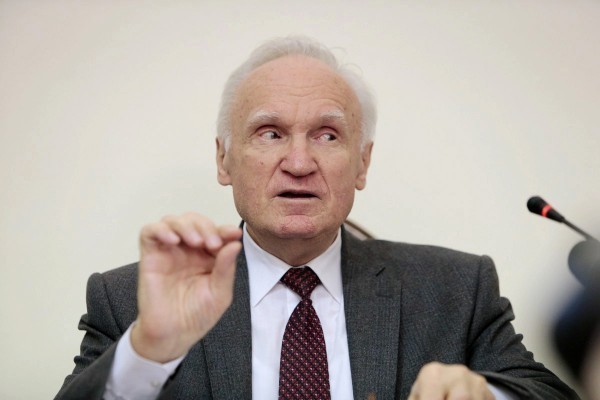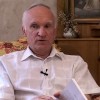On one hand, the proposed theme is quite general, while on the other hand, is fundamental and very difficult and addresses the issue in dynamic scope: the teaching on salvation and personal spiritual development. Here, not simply the Christian faith is considered, but there is an attempt to contemplate the indirect relation to human life.
When I was driving here, we exchanged various ideas, and I am convinced once again that even in terms of understanding the conditions of salvation, there are a number of complex issues. Salvation is very broad topic, so I will have to limit it to some narrow aspects. Often the question of salvation involves such difficulties, which, it seems, must be clear.
Under what conditions are the sacraments active?
We spoke about the importance of the sacraments for salvation. The question (that appears not to be a question) is self-evident. Everyone knows that if they are established by Christ and the Church (in so far as they are necessary and useful) it is evident to all. Everyone who has ever set out with due dispensation, also knows the effect of the sacraments and what they do with the soul of man, as they affect the mind, the heart and the human body itself. At the same time, though, there is a big question.
I have taken part in many interviews with non-Orthodox Christians —Catholics and various types of Protestants. The same thing has always occurred when touching on the question of salvation, the grace of God acting on a person, and the conditions of the action of that grace. The sacraments are carefully written about everywhere, but nowhere does it ever mention: Under what conditions do these sacraments act?
What is necessary for a person so that these sacraments are redemptive? What developments in man is expected so that these ordinances become real gifts of God? — Hardly ever.
It would seem that today’s Christians look at the sacraments as some magical actions that act by themselves. Spiritual development: “Well, I’m Orthodox. I believe in God and go to church. What else is needed?” And then again: “Sacraments, sacraments, and sacraments.” How easily we substitute the necessary internal activity to that which calls and asks Christ: “The Kingdom of God suffereth violence”, and those communing with it are those who push themselves (i.e. Christianity’s constant reference to the freedom of man, his personality, and participation of a person: “Son, give me your heart”). This moment goes by the wayside.
They give all their attention to the sacraments: the main thing at first is to be baptized — hardly a word is said about the sacrament of penance — and further is the Eucharist. Somewhere in the 60’s and 70’s, a process began in the West that can best be expressed in two words: Eucharistic boom. Everyone rushed to attack the Eucharist, all types of Protestants and Catholics for them. We Orthodox, of course , could not get with the program. Here, we are referring to the conditions under which the sacraments will be redemptive for me — and there wasn’t a word mentioned about it. The Apostle Paul , who writes —”For those who eat and drink without discerning the body of Christ eat and drink judgment on themselves. That is why many of you are sick and dying.” — simply doesn’t exist for us.
I say this from experience. It’s in all documents. I want to stand up and protest: Who are you – Gentiles who want to remake Christianity into the pagan way? This is the doctrine of the Catholics opera operato, that is, the sacrament is effective by virtue of the action committed.
The Orthodox teaching is quite different, not because the actions performed for us will be useful, but because of my spiritual dispensation. The Patriarch St. Cyril of Jerusalem, writes that “if you are hypocritical — people baptize you and the Holy Spirit will not.” Did you hear that? .. There, there are theologians who not only have heard, but know this.
Seraphim of Sarov, of the XIX century, warns: on the earth you can partake of the Eucharist, and in heaven remain uncommuned. For us, its as though these things do not exist. We do not pay attention to this very important matter.
None of Old Testament humanity took part in any sacraments, and how many of them are our saints: Abraham, Isaac, Jacob, the prophets, etc.
So, aren’t the sacraments necessary? No, we are not talking about that. You shouldn’t rush to extremes. Here, we are saying that a true spiritual dispensation is first for a person’s salvation and development. Only with this correct dispensation of the sacrament is there the force that acts in man, giving him grace, elevating him to God, and leading him to deification. Only with this condition does spiritual development of the individual begin.
Christianity speaks unambiguously about this condition, which is by no means what is written in all our dogmatics and theological textbooks — that faith is this condition. It seems that this is true, but a lot of questions arise. And the demons not only believe, but know — and who thus remains? All of Protestantism is built on a formula that we are saved by faith alone, and the believer’s present, past, and future sins are forgiven….
The robber was the first to enter heaven
If we turn, though, to the patristic tradition of the Church, it happens that faith is not primary. I recall the fact that the robber was the first to enter heaven. What was his spiritual development prior to the cross? Haven’t we read of “the wise thief who is among the saints of Our Father”?
The first condition that succeeds faith and the spiritual development of an individual are the words said by the robber, which were then repeated by a harlot and tax collector: “…we are receiving what we deserve for our deeds.” He realizes that his deeds and his life in no way correspond to the shrine, which has opened his soul a little — and each of us carries this shrine in his soul. This is evidenced by the voice of the conscience and the voice of the mind and heart, when we come in contact with it. Without this there can be no talk about spiritual development. Let us not be deceived not by rank, nor title, nor going to church, nor taking communion thousands of times, nor going to confession and give an account of our sins instead of repenting.
What did the robber say further? — “Remember me, O Lord, in Thy Kingdom.” His thoughts and feelings were not that he would find himself there with the Lord. That’s where there is beauty,where there is the source, that’s where there is life. Here begins the true faith, and not with the recognition that God is a Trinity, and that the Second Hypostasis was incarnated. Any demon knows more than all the doctors of theology combined. The spiritual development of an individual doesn’t begin with this formal faith, but with the realization that I am not what I should be. This truth affirms the Gospel and all the Holy Fathers unanimously.
When John the Baptist, a great ascetic and preacher, arrived and common people came to him (something was still lacking for those of status), what did he begin preaching? – “Repent!” The very baptism of John was called the “baptism of repentance.” Elsewhere in the Gospel it says that Jesus began his preaching with the words: “Repent, for the kingdom of Heaven is at hand.”
Here is the one thing that is enough to speak to a person of our time. It isn’t worth talking to a paralytic about successes weightlifting or sprinting. He just smiles sourly at that. We are in that position, but we don’t see the paralysis that struck us. If we look at ourselves, we will see that we can’t do one good deed without becoming proud and we don’t say: Glory to Thee, O Lord, that I am not a pound of raisins! I go to the temple and the Divine Service — of course, I don’t pray, but it doesn’t matter. Or keeping track, or vanity, conceit. I wouldn’t have committed any sort of sin if the Lord would have provided me with the appropriate conditions. When I sleep, I don’t sin.
Compare yourself with a reference
I always repeat the phrase of St. Theophan the Recluse, “I am trash of trash, but I tell everyone: ‘I am not like other people.’ ” Here is the dead end of spiritual development. All Orthodox asceticism aims for a person to see oneself, even a little. This is the most difficult thing — to see your damage. I am like Noah’s Ark — filled with reptiles and creeping things.
How does one achieve this apparition? – You need to compare yourself with a reference. This reference is those normal human traits that are named in the commandments of the Gospel. Meekness, forgiveness, love — these are the normal properties of a healthy person. Only on the path of compelling myself to fulfill the commandments of the Gospel do I see who I really am. Without it, I would never see myself.
The Holy Fathers assert that one who does not compel himself to fulfill the commandments and one who does not repent cultivates self-esteem when practicing a self-sacrificing and ecclesiastic lifestyle. It is called fascination in the ascetic language of the Fathers. Execution of everything external without addressing that for which Christ came, leads a person to arrogance, vanity and pride. It’s hard to find a more frightening warning.
The worst thing is when a person begins to see himself ever more holy and more perfect (while, of course, continuing to be sinful). For this is without fail apostasy from Christ — not external — but it is about deeper things stated in the Gospel. Who crucified Christ? A tax collector, a robber, a harlot? – No: high priests, chief priests, scribes, (i.e. theologians), and Pharisees (i.e. monks and lawyers — the elite of the Church). Expressed in our language, the Orthodox people. Do not delude yourself that it was then —not then, but it avails at all times.
Why did this happen? Why was this done by those who should have been the first to glorify Christ? The Holy Fathers answer unanimously: pride and an opinion about their righteousness. What words does Christ put into the mouth of the Pharisee in the parable? – “I am not like this tax collector.” This is what deprives us of Christ and completely deprives one of spiritual development. Pride is death that results from that which we externally place in first place, while the commandments are secondary. They turn a person on his head and then wonder: Why did he die?
“Poor, miserable and naked” —and this is the Orthodox ideal?
Is external ecclesiasticism needed? – Of course. Did Christ establish the sacrament in vain? Did the Church establish the Divine Service, feasts, and fasts in vain? – All of this has a means but not an end. These virtues are not established by themselves externally. The goal is for a person to see the extent to which he is a blemished creature, so that he would realize that he needs Christ, who saves him from envy, vanity, anger, and other abominations, — in the words of the Fathers: to lead a person to humility. This is the goal for all endeavors, and those who do not come to terms with this make everything meaningless.
Isaac the Syrian says: “Moral virtues are not an oblation and not work, just for the sake of it, but from them is born humility and if not for that all works, all virtues and everything that a person does is in vain — and then all the sacraments are in vain —because you have buried talent in the ground.” Sacraments aren’t a self-acting medium, but only those medicines that help man in his gradual acquisition of grace.
Ask a representative of any religion: What does spiritual growth and development mean? They say that a man acquires virtues and grows in this and that, and a person gradually becomes more and more perfect. Christianity agrees with the this with one “but”: spiritual development leads to a greater understanding of one’s powerlessness without God, and lifelessness without God leads to humility. Christianity is the only religion that says the degree of a person’s spiritual development depends on the extent of his humility (i.e. sincerely seeing yourself —how very poor, miserable and naked I am).
These fundamental things are more than enough for our time and our state of understanding, when we talk about personal spiritual development. I can’t and I am ashamed to talk about some spiritual states. Without the acquisition of these fundamentals it is absolutely useless to talk about Christianity.
Patristic experience speaks about how necessary it is. Macarius the Great, who was called “earthly god” for his amazing generosity and mercy to sinners, was sent to learn from two married women. Anthony the Great was sent to learn from a cobbler. They gave thanks to God for what they found there. Those gifts that they received from God do not save a person. Isaac the Syrian writes that many reached a very high level of spiritual life and had many talents — and ended their charmed life by suicide, because they were not based on the solid rock of humility.
The cobbler was shocked when Antony came to him. When he asked: “Tell me, what are you doing?” The cobbler, almost in a semiconscious state, replied: “Father, I am not doing anything. I see that all are being saved and I am dying alone.” Antony gave thanks to God, because he did not have that. He had the gifts of prophecy and miracles, but not that. He was also shocked, and left being deeply taught humility.
This is the beginning of individual Christian spiritual development, and the end of it — is endless. In other religions, man is promised blessings from God for leading a righteous life. These benefits can be both tangible (as in Islam) and spiritual.
Christianity is quite different. Macarius the Great says: “It is not a paradise that is promised to man — but Heaven, and not the bliss of paradise — but the Kingdom of Heaven.” The goal is God Himself, and not what He gives. That’s why our ideal is deification, and therefore “the Kingdom of God is within us” and not outside. That which is from the outside is given by the Antichrist — deceptive gifts. The ideal of humanity is God-manhood, the norm of God-manhood is is God-man — Christ. Entering the Church, the Body of Christ, we are entering into God-manhood through Christ, when we unite with God. Therefore, just as God is infinite in His love and goodness, our development is infinite in communion with God.
This is the limit of an individual’s spiritual development. The middle? – I don’t know. We have begun to know the beginning and will receive it in the end.
Translated from the Russian.






















